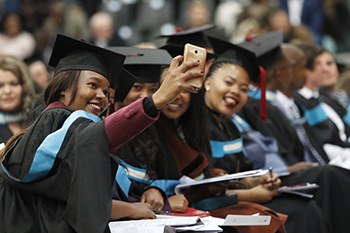
More than 5 000 degrees will be conferred over six days
and eleven ceremonies at the UFS mid-year graduation
ceremonies.
Photo: Johan Roux
Livestream of Graduation Ceremonies
“Make the choice to make a difference as the leaders of the future.” These words of Dr Susan Vosloo, Cardiothoracic Surgeon and member of the University of the Free State (UFS) Council, echoed the call to graduates on the first three days of the UFS mid-year graduation ceremonies. The ceremonies are taking place in the Callie Human Centre on the Bloemfontein Campus from 19 to 26 June 2017.
Dr Vosloo, also an alumna of the UFS, was one of six guest speakers at the biggest set of graduation ceremonies in the university’s history. A spirit of excitement is part of the festivities, as a total of 5 258 degrees will be conferred over six days in eleven ceremonies. The graduation week will conclude on 26 June 2017, when 460 master’s and doctoral degrees will be conferred – 72 of these are doctoral degrees.
Stand up and be counted
Dr Vosloo urged the graduands at the afternoon session on 19 June 2017 to stand up and be counted. “What we need are leaders who treasure integrity, dignity, accountability, transparency, and who will focus on the common challenges which we all face today.”
Dr Khotso Mokhele, UFS Chancellor, also encouraged the graduates to be agents of change who shouldn’t conform to the current system. “Decide that it is your country and that you will decide what it should be. Then it will not be the corrupt experiment which the current government turned it into. We wish you well. Go and be the agents of transformation.”
Ambassadors of the UFS
Prof Francis Petersen, UFS Rector and Vice-Chancellor, asked the graduates to make a contribution: “Be excellent ambassadors of the UFS, and make the UFS, your families, and our country proud by your strong, innovative, ethical, and excellent contributions.” He was the guest speaker during the morning and afternoon sessions on 20 June 2017.
He also said that they should never forget the supporting role others played in their success, whatever form it took.
Do it for those who fought for SA
Justice Connie Mocumie, Judge of Appeal at the Supreme Court of Appeal, encouraged the graduates to go out and contribute to the development of the country. She was the guest speaker at the morning and afternoon ceremonies on 21 June 2017.
“It is important for you to continue being experts in your area of expertise,” she said.
“Today is the beginning of better days to come. Do it for the legacy of those who fought for our country in pursuit of a better South Africa.”
Dipiloane Phutsisi, Principal and Chief Executive Officer of the Motheo TVET College in the Free State, said everyone is destined for greatness. “In the words of Dr Martin Luther King: Everyone has the power for greatness, not for fame but greatness, because greatness is determined by service.” She was the guest speaker at the morning session on 19 June 2017.
Click here to see a list of Deans’ and Senate medals awarded.